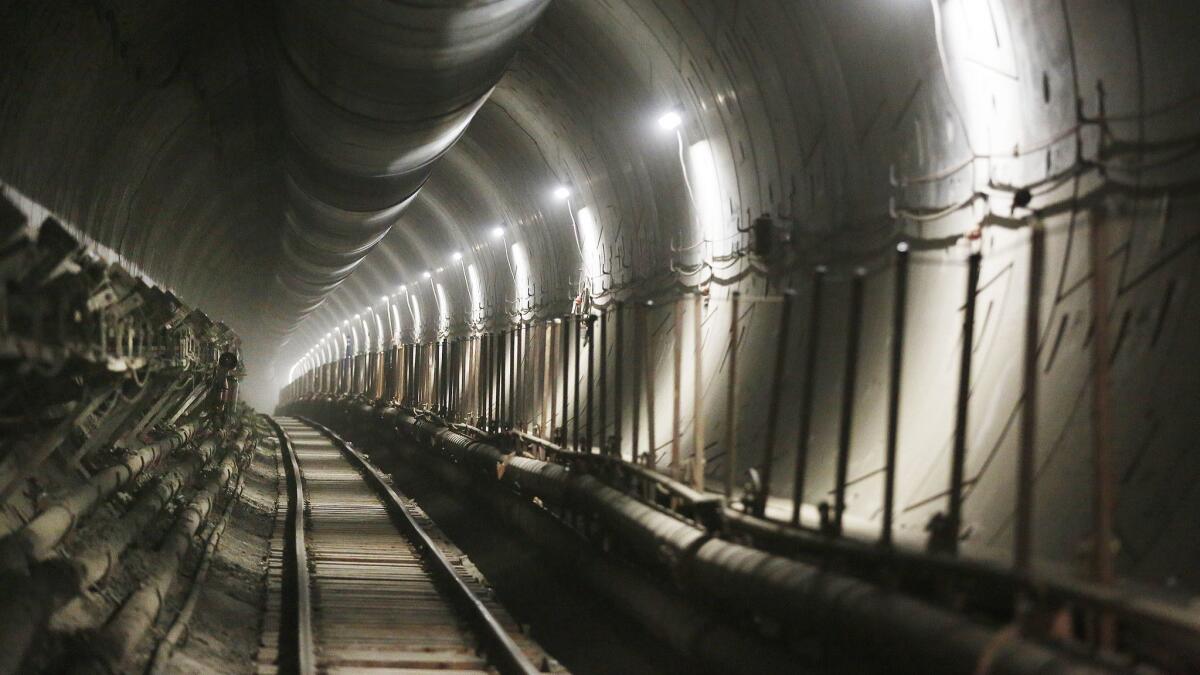Metro hires a contractor to build the Purple Line subway to West L.A.

- Share via
Los Angeles County transportation officials on Thursday approved the last major contract needed to build the Purple Line subway extension to the Westside, a significant step for the region’s most anticipated rail project in a generation.
The Metropolitan Transportation Authority’s board unanimously hired a joint venture led by Sylmar-based Tutor Perini Corp. to build two subway stations and install the tracks and signals inside two massive tunnels beneath Century City and West L.A.
Most of the $9-billion Purple Line will run beneath Wilshire Boulevard, the most-traveled mass transit corridor in the county. Metro expects to finish the subway by 2027, the year before Los Angeles hosts the Summer Olympics.
“It’s going to be done before the Olympics,” said Rick Clarke, Metro’s chief program management officer. “With all the contracts awarded, it’s a certain thing that the project is going to get completed.”
Metro plans to open the Purple Line project in three phases: from the current terminus in Koreatown to La Cienega Boulevard in 2023; to Beverly Hills and Century City in 2025; and to Westwood and West L.A. in 2027.
The subway will whisk commuters from the Westside to downtown in less than half an hour, and will generate 78,000 new daily trips on the county’s growing rail system, Metro officials say.
Ronald Tutor, chairman and chief executive of Tutor Perini, built much of the early Metro rail network. His company’s work on the first phase of the subway in the 1990s sparked a protracted legal battle.
Tutor Perini will share the $1.36-billion Purple Line contract with O&G Industries, which is based in Connecticut. Metro has also hired Tutor Perini to dig the tunnels for the second and third phases of the project.
The $3.2-billion West L.A. extension will add 2.56 miles of heavy rail and two new subway stations at Wilshire and Westwood boulevards and near the U.S. Department of Veterans Affairs campus.
Metro had originally planned to open the West L.A. segment of the project in the mid-2030s but accelerated the schedule by nearly a decade using revenue from Measure M, the sales tax increase that county voters approved in 2016.
Metro is also seeking $1.3 billion in federal grants and federally backed low-interest loans for the Purple Line. Similar agreements worth $2.75 billion have been approved for the first and second phases of the project.
The Federal Transit Administration’s acting administrator said last year that the funding for the Purple Line’s final phase would probably be awarded “sometime early” in 2019. Metro now expects a decision in August, Clarke said.
“The process is taking a little longer than we may have originally anticipated,” Clarke said. “Nothing is ever guaranteed, but we feel really confident that that’s going to come through.”
The contract approved Thursday was previously approved in February. Metro’s directors said at the time that work would begin when the federal funding agreement was signed.
But the deal won’t be done by May 31, when the bids for the stations, tracks and subway systems expire, Metro staff wrote in a memo to directors earlier this month. Allowing the bids to expire could add months and hundreds of millions of dollars to the project’s cost.
Under the terms approved Thursday, Metro can tell the contractor to begin work much sooner, because the agency has received a letter from federal officials confirming that local money spent on the subway project could be reimbursed if the $1.3-billion funding agreement is approved.
Metro used the same arrangement to move forward with the Purple Line’s tunneling contract last summer, rather than wait for the federal funding package.
The letter from federal officials arrived in September, 12 days before the tunneling bids would have expired. Rebidding the tunneling contracts would have added 22 months to the project schedule and $200 million to the budget, Metro said at the time.
For more transportation news, follow @laura_nelson on Twitter.
More to Read
Sign up for Essential California
The most important California stories and recommendations in your inbox every morning.
You may occasionally receive promotional content from the Los Angeles Times.











